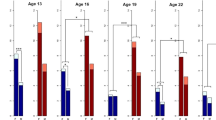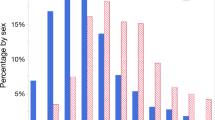Abstract
In the present study, we examined sexual knowledge, sexual behavior, and psychological adjustment of adolescents with blindness. The sample included 36 Dutch adolescents who are blind, 16 males and 20 females. Results of the interviews revealed no problems regarding sexual knowledge or psychological adjustment. Sexual behavior however, was more at risk. Adolescents with blindness had less sexual experiences and were older in having sexual experiences compared with youth without disabilities in the Netherlands. Subgroup analysis showed that boys with blindness scored higher on self-esteem if they had sexual intercourse. If boys perceived their family as overprotective they less often experienced sexual intercourse. Furthermore, if boys reported more family opposition, they more often had experienced sexual intercourse. These results were not found for girls in this sample. We would like to recommend to youth with visual impairments to be active in leisure activities, outside their homes, in the presence of peers.
Similar content being viewed by others
References
Richards, M.H., Crowe, P.A., Larson, R., Swarr, A.: Developmental patterns and gender differences in the child experiences of peer companionship during adolescence. Child Dev. 69,154–163 (1998)
Sharabine, H., Gershoni, R., Hofman, J.E.: Girlfriend, boyfriend: age and sexual differences in intimate friendships. Dev Psychol. 17,800–808 (1981)
Miller, B.C., Benson B.: Romantic relationship development during adolescence. In: Fruman, W., Bradford Brown, B., Feinberg, C. (eds.) The Development of Romantic Relationships in Adolescence, pp. 99–121. Cambridge university press, Cambridge (1999)
Bradford Brown, B., Feining, C., Furman, W.: Missing the love boat. why researchers have shied away from adolescence romance. In: Fruman, W., Bradford Brown, B., Feinberg, C. (eds.) The Development of Romantic Relationships in Adolescence, pp. 1–16. Cambridge university press, Cambridge (1999)
Kef, S. Outlook on relations. personal networks and psychosocial characteristics of visually impaired adolescents. Thela thesis, University of Amsterdam, Amsterdam, (1999)
Eide, A.H., Roysamb E.: The relationship between level of disability, psychological problems, social activities, and social networks. Rehabil Psychol. 47,165–183 (2002)
Lyons, R.F., Sullivan, M.J.L., Ritvo, P.G. Relationships in Chronic Illness and Disability. SAGE publications, Thousand Oaks (1995).
Sacks, S.Z., Wolffe, K.E.: Lifestyles of adolescents with visual impairments: an ethnographic analysis. J. Visual.Impair. Blindness 92, 7–17 (1998)
Dwyer, D.: Interpersonal Relationships. Routledge, London (2000)
Gordon, P.A., Tschopp, M.K., Feldman, D.: Addressing issues of sexuality with adolescents with disabilities. Child. Adol. Soc. Work. J. 21 , 513–527 (2004)
Borjeson, M.C., Lagergren, J.: Life conditions of adolescents with myelomeningocele. Dev. Med. Child. Neurol. 32, 698–706 (1990)
Suris, J.C., Resnick, M.D., Cassuton, N., Blum, R.W.: Sexual behavior of adolescents with chronic disease and disability. J. Adolescent Health. 19, 124–131 (1996)
McCabe, M.P., Taleporos, G.B.A., Dip, G.: Sexual esteem, sexual satisfaction, and sexual behavior among people with physical disability. Arch. Sex. Behav. 32, 359–369 (2003)
McCabe, M.P., Cummins, R.A., Deeks, A.A.: Sexuality and quality of life among people with physical disability. Sex Disabil. 18, 115–123 (2000)
Berman, H., Harris, D., Enright, R., Gilpin, M., Cathers, T., Bukovy, G.: Sexuality and the adolescent with a physical disability. Understandings and misunderstandings. Comp. Ped. Nurs. 22, 183–196 (1999)
Visser, A.P., Van Bilsen, P.: Effectiveness of sex education provide to adolescents. Patient Educ. Couns. 23, 47–160 (1994)
Blackburn, M.: Sexuality, disability and abuse: advice for life ... not just for kids. Child. Care Health Dev. 21, 351–361 (1995)
Shapland, C.: Speak up for health: preparing adolescents with chronic illness or disabilities for independence in health care. PACER Center Inc, Minneapolis (1993)
Blum, R.W., Resnick, M.D., Nelson, R., St. Germaine, A.: Family and peer issues among adolescents with spina bifida and cerebral palsy. Pediatrics 88, 280–285 (1991)
Kef, S., Dekovic, M.: The role of parental and peer support in adolescents well- being: a comparison of adolescents with and without a visual impairment. J Adolescence 27, 453–466 (2004)
Davies, J.: Sexuality Education for Children with Visual Impairments. Dalhousie University, Halifax, Nova Scotia (1996)
Kalksma, S.: Eye for each other. Research into friendships of youth with a visual impairment (in Dutch: Oog voor elkaar, master thesis). University of Amsterdam, Amsterdam (2005)
Sloep, A., Reek, S.: Love is blind. Research into the perception of dating and sexuality of adolescents who are blind. master thesis. University of Amsterdam, Amsterdam (1998)
Huurre, T.M., Aro, H.M.: Psychosocial development among adolescents with visual impairment. Eur. Child. Adoles. Psych. 7, 73–78 (1998)
Rosenblum, L.P.: Best friendships of adolescents with visual impairments: a descriptive study. J. Visual. Imp. Blindness. 92, 593–608 (1998)
Sacks, S.Z., Wolffe, K.E., Tierney, D.: Lifestyles of students with visual impairments: preliminary studies of social networks. Except Child. 64, 463–478 (1998)
Kef, S.: Psychosocial adjustment and the meaning of social support for visually impaired adolescents. J. Visual. Imp. Blindness. 96, 22–37 (2002)
De Leeuw, E.D., Hox, J.J., Kef, S.: Computer Assisted Self-Interviewing tailored for special populations: overcoming the problems of special interviews and sensitive topics. Field Methods. 15, 223–251 (2003)
Rosenberg, M.: Conceiving the Self. Basic, New York (1979)
Dodds, A.G., Ferguson, E, Flannigan, L.N.H, Hawes, G., Yates, L. The concept of adjustment: a structural model. J. Visual. Imp. Blindness. 88, 487–497 (1994)
De Graaf, H., Meijer, S, Poelman, J., Vanwesenbeeck, I.: Seks Onder Je 25e. Rutgers Nisso Groep/Soa Aids Nederland, Utrecht (2005)
Harris, J.H.: The Nurture Assumption. Why Children Turn out the Way They Do. Touchstone, New York (1999)
Acknowledgments
The authors would like to thank Anoushka Sloep and Sandra Reek (educationalists and alumni of the University of Amsterdam) for their contribution in the study on sexual behavior. Parts of this study were funded by the Dutch federation of parents of children with visual impairments (FOVIG) and by InZicht, a Dutch foundation for research concerning persons with visual impairment (grant number 943-01-001).
Author information
Authors and Affiliations
Corresponding author
Rights and permissions
About this article
Cite this article
Kef, S., Bos, H. Is Love Blind? Sexual Behavior and Psychological Adjustment of Adolescents with Blindness. Sex Disabil 24, 89–100 (2006). https://doi.org/10.1007/s11195-006-9007-7
Published:
Issue Date:
DOI: https://doi.org/10.1007/s11195-006-9007-7




